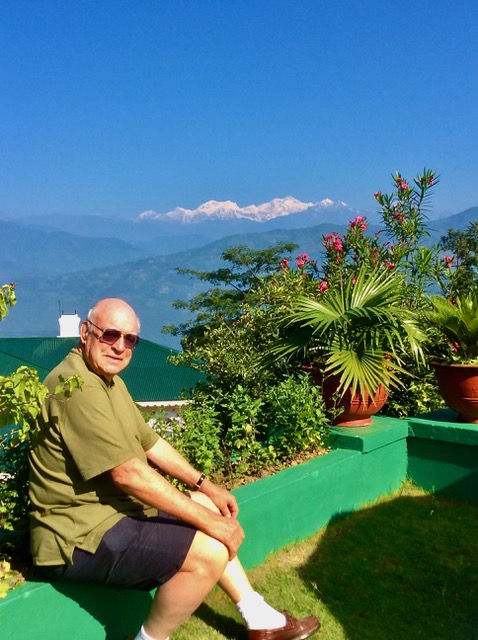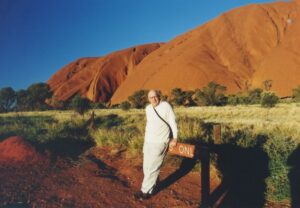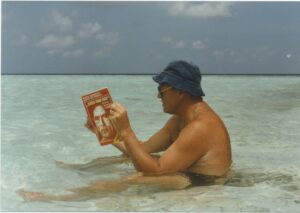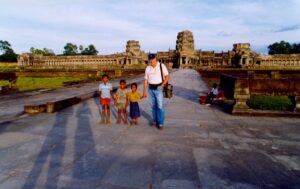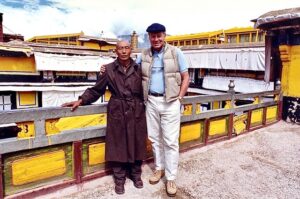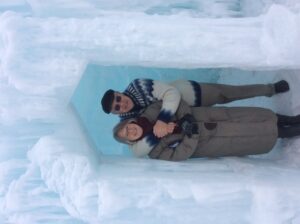Mike Hruška
I am the oldest son of Miroslav Hruška and Marta Hruška (nee Krobathova). I am not a refugee from Czechoslovakia, nor have I ever fled from persecution. My journey to Canada in 2002 came from an entirely different and quite circuitous, route. Indeed, it can be said that I just happened to be in the right place at the right time.
My parents, who worked for Bata in Zlin, were neither economic migrants, nor political exiles but a strange combination of the two. They had the opportunity to begin a new life in India where a job would be waiting, and they took it. On the 20th December 1938, after a year and half of preparation, Mum and Dad left Czechoslovakia. They travelled by train to the German border at Lundenburg, then through to Marseille in France where they caught a boat that took them to Bombay. From here, they made their way across India by train to Calcutta. In March 1939, the Germans occupied the rest of pre-war Czechoslovakia. World War II would erupt in a few months, thus cutting my parents off from any return home.
No one had any idea what was actually going to happen in Czechoslovakia. In fact, I hesitate to use the word “migrant” with reference to my parents because it implies that they had no desire to return to their country of origin. I do not believe that this was the case. At the outset, I think that they saw their departure for India as a short-term measure; and, frankly, it was a great adventure. But I believe they fully intended to return to Czechoslovakia after the war was over (if, indeed, war came at all). But with the Communist takeover in Czechoslovakia, any opportunity to return evaporated; at this point, they could definitely have been described as political migrants.
Without doubt, this decision was the pivotal event of their Czech years: recognition that a war was likely coming to Europe and taking up Tomáš Bata’s suggestion that they leave Zlin for Calcutta where they could start a new life. They were lucky to have known him. Trapped by world events, like other Czechs in India, my parents set about making a home in Calcutta where my father established a successful business that he maintained for the next three and a half decades.
I still think of Calcutta as the home of my heart
I was born in November 1940. The next year, my father left his employment at the Bata factory, which meant moving from company housing at Batanagar into Calcutta itself. There, he found work at an English company called Metal Box, which manufactured war-time goods to support the Allies in their defence of India against the advancing Japanese threat in Burma. While my father was working at Metal Box, a business opportunity arose; so, before the war ended, he left to begin his own company manufacturing hurricane lanterns.
I still think of Calcutta as the home of my heart. Our family lived in an apartment in Chowringhee Rd, a street closely associated with Calcutta’s early history. The apartment faced directly onto St. Paul’s Cathedral, the major Anglican Cathedral. As a young child, I played in the impressive gardens of St Paul’s.
I do have some very clear memories of the post-war years in Calcutta. In August 1946, as a boy of six, I experienced the aftermath of the Great Calcutta Killings, a brutal, religious community strife between Hindus and Muslims. I recall that my mother stayed in the apartment for days and that, when she and I finally did venture out to buy food at the local market, we had to step over and around dead bodies everywhere.
As a six-year-old, I was ready for schooling. Following the prevailing custom of the British in India, my parents sent me to North Point, a boarding school in Darjeeling, northern Bengal, close to the Himalayas. The school was run by Belgian Jesuits, who had a reputation for being great educators and disciplinarians. I attended North Point from the age of 6 to 13, when my parents sent me even further away for the rest of my schooling to Stonyhurst in Lancashire, England. On graduation, I won a scholarship to attend the London School of Economics but decided instead to continue my education at Sydney University, in Australia. In the early 1960s, most of the Czech community in Calcutta was beginning to relocate to Sydney because of the political shift to communism in Bengal. I thought this would be a great opportunity to live with my family for the first time since I was six years old. So, between 1960 and 1964, I completed an Electrical Engineering degree (specialising in telecommunications) and a B. Science in Physics and Pure Mathematics.
After I graduated from Sydney University, I decided to take a short break, visit Europe and see my relatives in Czechoslovakia. While visiting a family friend in Hamburg, West Germany, I was offered and accepted a job at Philips Central Laboratories, which conducted research in the field of Lasers and Opto-Electronics.
While in Hamburg, I met a girl – who was half German/ half Norwegian; after a time, we got married there. It soon became obvious that my Philips salary was not adequate for us to live in Hamburg and so we decided to move to Sydney. Within six days, I had found work as a telecommunications engineer. This was still the analog era; my first task was to work with High Frequency (HF) radio stations installing and operating transmitters and receivers. But, I could see that the field was changing faster than an engineer could keep up with it; so, in 1973, I completed a Master of Business Administration specialising in finance and accounting. This decision later turned out to be a lifesaver. When digital technology replaced analog, and retraining was not an option, I proposed to my boss that I alter my career course to work in business development in S.E Asia, taking a young technology “turk” in tow to handle the technical digital issues for prospective clients. My company agreed and so the next chapter of my career developed. From there, I gravitated to satellite telecommunications, work that entailed the design, building and operation of satellite earth stations in Australia, S.E Asia and later Kazakhstan and a few other –istan states in the region. We even erected a satellite dish on the roof of a public utility in Moscow. While there, I got to see a performance of the Bolshoi Ballet. Then came the highlight of my professional career. From July 1992 to February 1993, I was the country Project Manager responsible for the UNTAC Cambodia telecommunications project. UNTAC was established under the 1991 Paris Agreements to supervise a ceasefire and general election in Cambodia. We designed, built and installed the telecommunications network for the whole country so that the UN could hold the elections. Later, as my career came to a close, I worked extensively on projects in Thailand (a Point of Sale (POS) network), India (Establishment of digital data networks for Indian companies) and Pakistan (cell phone network).
Towards the end of my working life, my first marriage fell apart. In the next few years, while I was trying to make sense of it all, I met my second wife, who was visiting friends in Sydney. Meeting Evie coincided with my retirement and the next big decision was to move to Canada in 2002. One thing I was particularly looking forward to was the prospect of four seasons, something that I missed greatly. In Australia, we essentially had two seasons: hot and hotter. I also looked forward to living close to the Rockies. After growing up in the shadow of the Himalayas, I was very much a mountains person. At first, we lived in Evie’s house, but then decided to combine our resources and moved to Riverbend, which was closer to the North Saskatchewan River Valley, North America’s largest stretch of urban parkland. My initial reaction to Edmonton was “Wow! This is a small city.” I found the transition to life in Edmonton relatively easy. I did not arrive as a refugee or migrant. I was fortunate in that regard. We all spoke English, even though I had to get acquainted with new idioms and expressions that were alien to me. One of the great differences between the two cities was that people in Edmonton talked of community and lived it as a conscious act of participating in their community. This was alien to me, but I embraced this aspect of life. In my own case, I acquired a few “communities” of my own, including participation in the Czech community.
Although my journey to Canada has not followed the path followed by many others, I am just as grateful to be here
We became part of the Australian Wine club – many Canadians and two Australians – who shared a love of Australian wine, something not very hard to get used to; this association endured over many years, and we made good friends here. And one Sunday at a Baroque concert, I happened to sit behind Paul Jelen; Czech was being spoken and this chance encounter opened the door into the Edmonton Czech community, which has further enriched my life here. Through my initial contact with Paul Jelen, I became more and more involved with the Czechoslovak Society of Arts and Sciences of Alberta (SVU), first as a member, and now as a fully participating member of the Board. Being part of this organisation has become a source of satisfaction and the chance to get involved in its goals and activities.
Even though I was not born in Czechoslovakia, my interest in it has only increased since I came here. Edmonton, unlike Australia, is an affordable distance from Europe, so we visit as often as we can. Over the years, we have made friends there outside the family and we have taken every opportunity to get acquainted with other parts of the country. The 2018 anniversaries have been a window for me to learn more about Czech history, which was something I had not appreciated or understood in my youth. I have been particularly struck by the blooming of the arts after the fall of communism. How could I not be proud of such heritage! Although my journey to Canada has not followed the path followed by many others, I am just as grateful to be here. I am endlessly amused to be living in this unique and remarkable province. And the country is now my home. So, I can sing “O Canada” quite happily knowing I am in a country that makes its immigrants feel welcomed, respected and safe. And, in keeping with the official bi-lingual policy, I can add “Merci beaucoup”.
The Czechoslovak Talks thanks to Ondrej Havac from the Department of History, Faculty of Arts, Masaryk University in Brno.




